
Electronic english version since 2022 |
The newspaper was founded in November 1957
| |
Scientists - School
JINR - a "place of power" for teachers
After a break due to Covid-19 restrictions, the JINR University Centre resumed holding Scientific Schools for physics teachers. The current School has become international - teachers from the Russian cities of Arkhangelsk, Bryansk, Novy Urengoy, Noyabrsk, Saratov, Severodvinsk, Tula and others, as well as teachers from Armenia, came to Dubna. On excursions in the JINR laboratories, teachers learned about the research carried out at the Joint Institute, saw the basic facilities, received master classes, learned about the Dubna University and the city itself. On the last day of School, they shared their impressions with our correspondent.
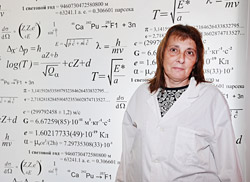 O.I.Shishkina (Petropavlovsk-Kamchatsky): I learned about JINR after the information center of the Joint Institute had been opened in our city. A large delegation visited us in May, researchers from Russia and other Member States gave lectures, I went to listen withy my students. I mentioned there: listening to lectures is one thing, but seeing an accelerator and feeling it with your hands is quite another and Head of the information center in Kamchatka told me about this School. I was very worried while waiting for a decision on my participation. And it turned out that I was the only one from the Far East, I was lucky to get here, to see everything with my own eyes - the reactor, accelerators, to feel the atmosphere of science, this is something supernatural! Many thanks to all the organisers, because listening to lectures and watching videos are great, but they cannot be compared with personal impressions. Such Schools should be organised more often.
O.I.Shishkina (Petropavlovsk-Kamchatsky): I learned about JINR after the information center of the Joint Institute had been opened in our city. A large delegation visited us in May, researchers from Russia and other Member States gave lectures, I went to listen withy my students. I mentioned there: listening to lectures is one thing, but seeing an accelerator and feeling it with your hands is quite another and Head of the information center in Kamchatka told me about this School. I was very worried while waiting for a decision on my participation. And it turned out that I was the only one from the Far East, I was lucky to get here, to see everything with my own eyes - the reactor, accelerators, to feel the atmosphere of science, this is something supernatural! Many thanks to all the organisers, because listening to lectures and watching videos are great, but they cannot be compared with personal impressions. Such Schools should be organised more often.
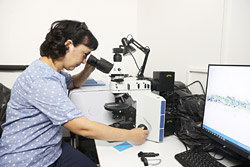 R.I.Galimova (Ishimbay): I don't know if anyone from Bashkiria has visited here before us, my colleague and me are pioneers. We are delighted and have never regretted that we came. There are very few laboratories like here in Russia, we don't have them in Bashkiria at all. The trip is very informative, useful, we have gained a certain store of knowledge, information that needs to be shared with colleagues and children, to improve the level of knowledge. It would be good if such Schools were organised more often and not only by your Institute, but throughout Russia. Every evening we gather at the hotel with colleagues, discuss the issues of Russian education, Russian science, there are nuances that need to be worked on not only by teachers, but also by ministries.
R.I.Galimova (Ishimbay): I don't know if anyone from Bashkiria has visited here before us, my colleague and me are pioneers. We are delighted and have never regretted that we came. There are very few laboratories like here in Russia, we don't have them in Bashkiria at all. The trip is very informative, useful, we have gained a certain store of knowledge, information that needs to be shared with colleagues and children, to improve the level of knowledge. It would be good if such Schools were organised more often and not only by your Institute, but throughout Russia. Every evening we gather at the hotel with colleagues, discuss the issues of Russian education, Russian science, there are nuances that need to be worked on not only by teachers, but also by ministries.
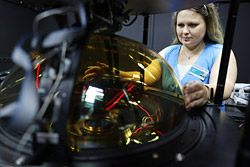 Yu.K.Deych (Kaliningrad): This is a unique event, it is very important to get together after the pandemic in person, first of all, for teachers. Teachers, from a physical point of view, are the conductors between great science and our students. Introducing our students to knowledge, to great science is very important and it is difficult to overestimate the role of the teacher here. This School is unique; in principle, there are few such events for teachers. This is a kind of place of power for teachers where one can gain new knowledge, a boost of energy for further work with children, in general, with future scientists. The nurturance of the researcher begins with the school bench. When you read the biographies of scientists, you often come across gratitude to teachers who kindled their interest in science. This initial step is very important.
Yu.K.Deych (Kaliningrad): This is a unique event, it is very important to get together after the pandemic in person, first of all, for teachers. Teachers, from a physical point of view, are the conductors between great science and our students. Introducing our students to knowledge, to great science is very important and it is difficult to overestimate the role of the teacher here. This School is unique; in principle, there are few such events for teachers. This is a kind of place of power for teachers where one can gain new knowledge, a boost of energy for further work with children, in general, with future scientists. The nurturance of the researcher begins with the school bench. When you read the biographies of scientists, you often come across gratitude to teachers who kindled their interest in science. This initial step is very important.
O.A.Korogodova (Ishimbay): Such events should be held more often and again word of mouth helped, if the Ministry of Education of Bashkiria sent us information, the number of people wishing to get here would increase greatly and the geography would expand. The School is very informative, exciting and you get to know teachers from different regions, learn from experience, so I am very pleased that I got here.
V.A.Semibratova (Irkutsk): I work part-time as a teacher at the Lyceum of the Irkutsk State University, but actually I am a lecturer at the Irkutsk State University. Both from the position of a teacher and from the position of a lecturer, this School is informative, it is useful not only for my own development, but also for my colleagues, who I will pass on this experience to. I consider this project unique, interesting, enriching with the opportunity to communicate with real scientists, to learn about science. It was all the more interesting for me that a lot was told about my native land, about Baikal. I certainly know about the neutrino telescope in the lake and the additional information was useful to me. I thank our organisers, who were able to present the material in such an interesting way, to collect every material that is significant for us and I also want to say about the sincerity of this event, the atmosphere was very friendly - thank you very much!
Nelli Asoyan (Masis, Armenia): Information about the School was disseminated by our Ministry of Education, my colleagues and me submitted applications and two out of three teachers came here. It is very interesting here, we were much told in a very popular way. We will tell the children about everything that we saw and heard. It is wrong that school is separated from science. And we saw a lot, it's better to see once than to hear a hundred times. We were shown interesting research programs, experiments, I will definitely use this in my lessons. We spoke about a lot with our Russian colleagues, discussed common issues, exchanged experience - we have something new and they have something new.
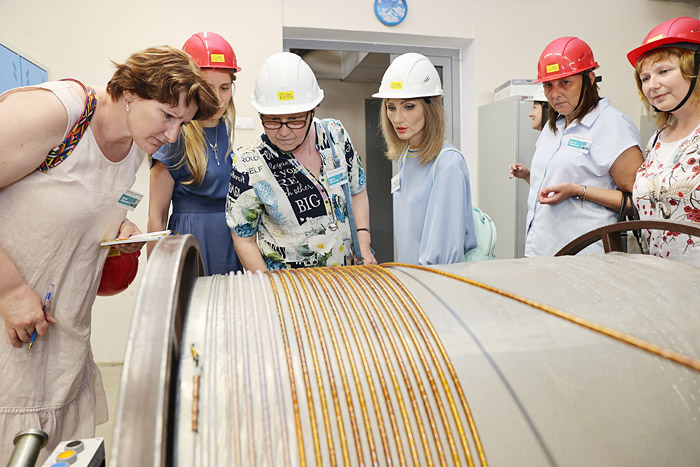
"This year the teachers did not take their students with them, why?", I ask a question to a member of the organising committee of the School E.G.Karpova.
"This year, Dubna University has restored its full-time programs for schoolchildren thus having enrolled quite a lot of students. We decided to gradually enter face-to-face mode and not to organise two parallel programs. We started with 20 teachers, they were joined by a teacher from Dubna, who came, if I am not mistaken, from Barnaul to work at the V. G. Kadyshevsky Lyceum, she had previously participated in our School at CERN. In general, we are happy to return to the full-time format, it confirms its efficiency. Teachers meet with scientists, moreover, I hear stories from them when School participants in a hotel, for some household chores, talk to our researchers. Such direct contact, open communication is always valuable and this is exactly what children should be told about, who imagine scientists as some kind of gray-bearded old men doing something extremely difficult. And they turn out to be young fellows who it is easy to communicate with.
This year, we expanded the informal part of the School to include, fortunately, a concurrent science comics exhibition at the Universal Library. Director Maria Pilipenko took us around the exhibition, in the library they use short formats of 15x4, when four different lectures are given for 15 minutes, short lectures, short discussions. Science comics are based on the same principle - in 5-6 images it is told about the research area, it turns out that this is possible and it is interesting. And first of all, it is interesting for young people and adults gradually understand that it is possible to work with such a format. This is more difficult than giving an hour-long lecture, but such work is already underway. The teachers liked the library very much, it is not classical, but breathing freely, allowing itself little pranks. It is impossible to remember all their formats but, fortunately, the library has a wonderful wall of posters that it releases for its events and the teachers photographed the posters. They, it seems to me, have bit it on that and will be able to apply it in their schools.
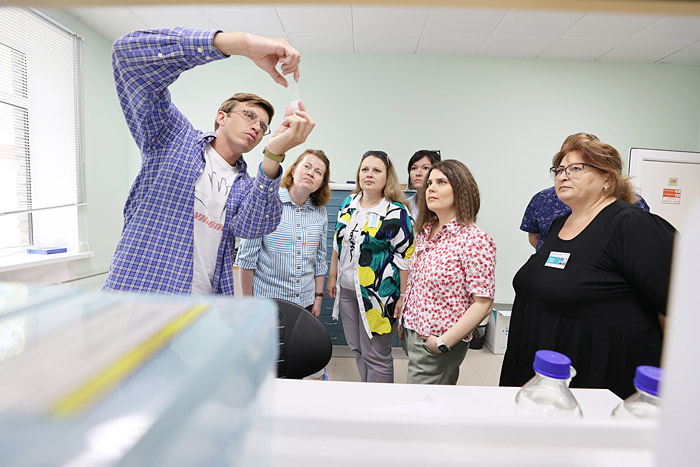
Of course, there were our classic lectures on the research areas of the Institute, visits to laboratories, we have gone nowhere from it, this is our base. There were also two blocks in the program dedicated to methodological work, recommendations for teachers to help them build a lesson, introduction of the physics textbook "Spheres", developed by members of our department, the group of Yu.A.Panebrattsev. Master classes were organised for teachers, they studied on computers and they can carry out this virtual laboratory work in their classes. Traditionally, we introduce our university to teachers, they also liked it. The teachers were shown the laboratory of electronics and microprocessor technology, the laboratory for prototyping, the laboratory for testing composite materials, everything was told about very popularly. It is obvious that the university interested teachers, they appreciated the cozy, homely atmosphere, the friendly people working there, so new applicants will surely appear in Dubna."
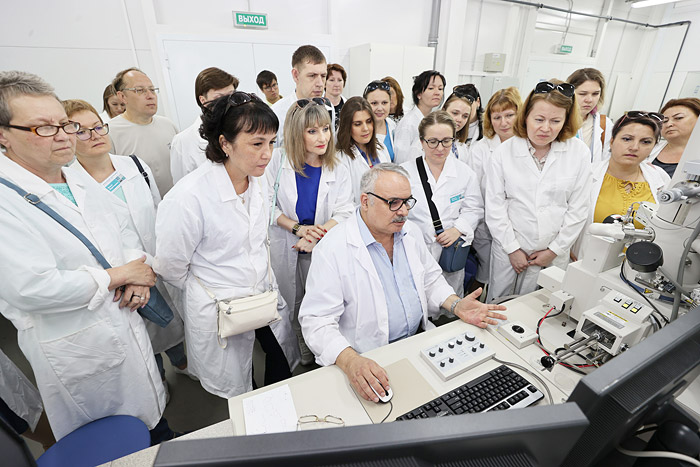
"The teachers really liked our city," 'Elena summed up her comment, "they walked along the embankment with pleasure, some said: why didn't you warn us that we should take swimsuits? The teachers were so inspired first and foremost by applied research that we just sometimes didn't have enough time to have a talk. I think we have managed to solve one more problem, to make teachers closer to each other, to bring Petropavlovsk-Kamchatsky closer to Kaliningrad and Novy Urengoy to Saratov. We hope that this will bear fruit and young people will go where physics, engineering and IT specialties are studied. Perhaps, some of the graduates of the teachers of our current School will enter Dubna University and then work at JINR. We are confident that we do a great and necessary work."
Olga Tarantina,
photo by Igor Lapenko